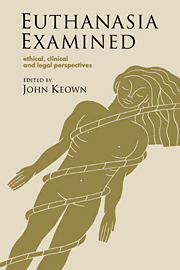Book contents
- Frontmatter
- Contents
- List of contributors
- Acknowledgements
- Foreword by Daniel Callahan
- Introduction
- 1 Euthanasia and the value of life
- 2 A philosophical case against euthanasia
- 3 The philosophical case against the philosophical case against euthanasia
- 4 The fragile case for euthanasia: a reply to John Harris
- 5 Final thoughts on final acts
- 6 Misunderstanding the case against euthanasia: response to Harris's first reply
- 7 Euthanasia: back to the future
- 8 The case for legalising voluntary euthanasia
- 9 Extracts from the Report of the House of Lords Select Committee on Medical Ethics
- 10 Walton, Davies, Boyd and the legalization of euthanasia
- 11 Where there is hope, there is life: a view from the hospice
- 12 Letting vegetative patients die
- 13 A case for sometimes tube-feeding patients in persistent vegetative state
- 14 Dilemmas at life's end: a comparative legal perspective
- 15 Physician-assisted suicide: the last bridge to active voluntary euthanasia
- 16 Euthanasia in the Netherlands: sliding down the slippery slope?
- 17 Advance directives: a legal and ethical analysis
- 18 Theological aspects of euthanasia
- Index
8 - The case for legalising voluntary euthanasia
Published online by Cambridge University Press: 03 May 2010
- Frontmatter
- Contents
- List of contributors
- Acknowledgements
- Foreword by Daniel Callahan
- Introduction
- 1 Euthanasia and the value of life
- 2 A philosophical case against euthanasia
- 3 The philosophical case against the philosophical case against euthanasia
- 4 The fragile case for euthanasia: a reply to John Harris
- 5 Final thoughts on final acts
- 6 Misunderstanding the case against euthanasia: response to Harris's first reply
- 7 Euthanasia: back to the future
- 8 The case for legalising voluntary euthanasia
- 9 Extracts from the Report of the House of Lords Select Committee on Medical Ethics
- 10 Walton, Davies, Boyd and the legalization of euthanasia
- 11 Where there is hope, there is life: a view from the hospice
- 12 Letting vegetative patients die
- 13 A case for sometimes tube-feeding patients in persistent vegetative state
- 14 Dilemmas at life's end: a comparative legal perspective
- 15 Physician-assisted suicide: the last bridge to active voluntary euthanasia
- 16 Euthanasia in the Netherlands: sliding down the slippery slope?
- 17 Advance directives: a legal and ethical analysis
- 18 Theological aspects of euthanasia
- Index
Summary
The law is in effect the codification of the will of the people, and when there is such tension between a legal verdict and the people's thinking then it is time to reconsider the law.
The verdict referred to in this British Medical Journal editorial is Dr Nigel Cox's conviction for attempted murder. His patient of long standing, Lillian Boyes, who had made her wish for a tranquil death very plain to him, was dying in extreme agony when he gave her a lethal injection. Similar comments were made in the Lancet, and most of the quality newspapers; it amounted, in Professor Ronald Dworkin's view, to the launching of a campaign to legalise euthanasia in such cases.
The general expectation was that a Royal Commission would be the appropriate body to examine the issue, but in the event it was a House of Lords Select Committee on Medical Ethics which was set up for this purpose. It reported in February 1994. Its terms of reference were:
to consider the ethical, legal and clinical implications of a person's right to withhold consent to life–prolonging treatment, and the position of persons who are no longer able to give or withhold consent;
and to consider whether and in what circumstances actions that have as their intention or a likely consequence the shortening of another person's life may be justified on the grounds that they accord with that person's wishes or that person's best interests;
and in all the foregoing considerations to pay regard to the likely effect of changes in law or medical practice on society as a whole.
- Type
- Chapter
- Information
- Euthanasia ExaminedEthical, Clinical and Legal Perspectives, pp. 83 - 95Publisher: Cambridge University PressPrint publication year: 1995



